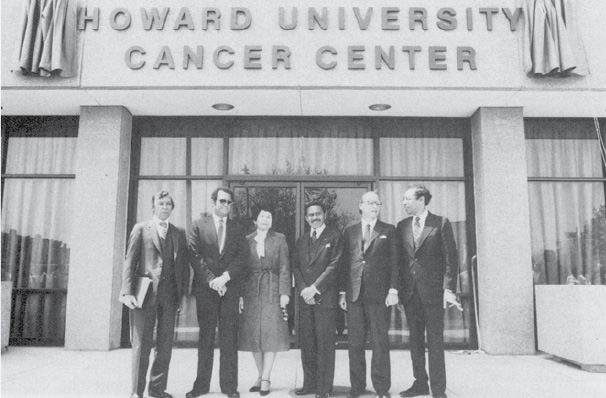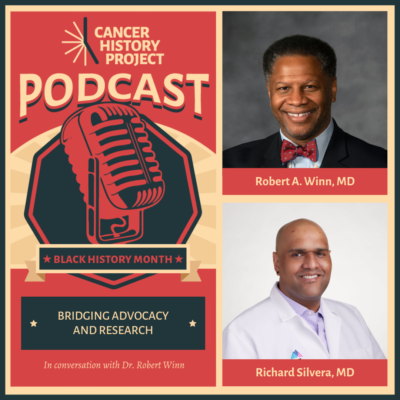

Director and Lipman Chair in Oncology, VCU Massey Cancer Center,
Senior associate dean for cancer innovation, VCU School of Medicine,
Professor, Division of Pulmonary Disease and Critical Care Medicine,
Virginia Commonwealth University;
Guest editor, The Cancer History Project
Ask members of the oncology community about the Howard University Cancer Center (HUCC), and more than 70 years later they will more than likely mention the man who laid the foundation for it.
“Today HUCC is still known as ‘the house that Jack built,’” said Carla Williams, PhD, associate professor of medicine and public health and interim director at HUCC.
The Jack to whom Williams refers is Jack E. White, MD, and his cancer legacy began in the early 1950s when he started the Tumor Clinic in Annex I at Freedmen’s Hospital, itself founded in 1862 to provide treatment to former slaves.
White was born in July 1921 in Stuart, FL, a small fishing village at the time that today is pegged as the Sailfish Capital of the World. He completed his undergraduate studies at Florida Agricultural and Mechanical University, a public, historically Black university located in Tallahassee.
White then served in the United States Army and received his medical degree from Howard University. After an internship and residency at Freedmen’s Hospital, White made surgical oncology history at Memorial Hospital, the present day Memorial Sloan Kettering Cancer Center.
“Jack White being the first Black surgeon to train at Memorial gives all of us a chance to understand what is possible once the door is opened,” said Selwyn M. Vickers, MD, FACS, president and chief executive officer of MSK.
Open doors is what White continued to do when he joined the faculty of the Howard University College of Medicine in 1951. There, he mentored such notable physicians as LaSalle D. Leffall Jr., MD, FACS; and William W. Funderburk, MD, FACS.
White was one of the first Black individuals to become a diplomate of the American College of Surgeons and to serve on the staff of the Washington Hospital Center, which is now part of the MedStar Health not-for-profit healthcare organization in the Baltimore–Washington metropolitan area.


Source: Journal of the National Medical Association
At Howard, White was the oncology department chairman from 1974 to 1986. Under his leadership, research focused on cancer risk factors, including tobacco use, diet and exposure to substances in the environment. He also began posing hypotheses about the structural and social determinants of cancer disparities.
“Forty years ago, terms like disparities and equity had not come into vogue,” said Williams. “However, Dr. White and his colleagues clearly described the epidemiology of differences in cancer incidence and mortality by publishing ‘Comparison of the cancer deaths in the black and white U.S.A. population from 1949 to 1967 in 1972.’”
While breaking ground at Howard, White also worked on civil justice issues. His family helped to integrate the Brookland neighborhood in Northeast Washington, D.C., and he looked at cancer in a broader scope. He helped advance cancer programs in Cuba, Haiti and Ethiopia. In the United States, White held an advisory role at FDA and at the local level in DC.
Other relationships he forged across previous divides remain today.
“A little known fact is that under Dr. White’s leadership, Howard became the 16th National Cancer Institute designated Comprehensive Cancer Center in the country,” Williams said. “In 1974, through a unique partnership, Howard and Georgetown Universities joined forces as the Howard University-Georgetown University NCI-Designated Comprehensive Cancer Center, making Dr. White the first African American to lead an NCI-designated Cancer Center. Today the two institutions continue strong collaborations in cancer and translational science.”
White was active in several professional organizations, including the Medico-Chirurgical Society of the District of Columbia; American Cancer Society; Southeastern Cancer Research Association; Alpha Omega Alpha medical honor society; the Institute of Medicine; and the James Ewing Society. In 1976, White was a founding member of the American Society of Preventive Oncology.
White retired from Howard in 1986. He received the Distinguished Alumni Achievement Award in March 1988.
Just four months later, in July 1988, White passed away at the age of 66 from cancer, the very disease he treated and researched for so many years. He left behind a wife and five children.


Source: Journal of the National Medical Association
Today HUCC continues to recognize and foster White’s spirit of leadership.
“Community leaders who develop new resources or programs to address unmet needs in communities that are disproportionately affected by cancer are recognized with the Cancer Center’s Founder’s Award,” Williams said. “The Jack E. White student prize encourages Howard medical students to pursue oncology specialties.”
White’s legacy lives on through the next generation of physicians and researchers who care to make a difference in the lives of people everywhere.
The Cancer History Project Podcast: Winn and Silvera
In this conversation, Richard Silvera, assistant professor of infectious disease at Icahn School of Medicine at Mount Sinai, speaks with Robert A. Winn, director of the Virginia Commonwealth University Massey Cancer Center and guest editor of the Cancer History Project during Black History Month.
Silvera is a recipient of a grant from the Robert A. Winn Diversity in Clinical Trials Award Program, which was established in 2020 by the Bristol Myers Squibb Foundation.
In this episode Silvera discusses his work caring for patients with anal cancer in the Bronx, and how doctors can gain the trust of underserved populations.
“None of this work happens in isolation, but I don’t want to just be one researcher on an island by myself. I want to be part of a community of researchers doing this work,” Silvera said.
A transcript of this recording appears in The Cancer Letter.
This column features the latest posts to the Cancer History Project by our growing list of contributors.
The Cancer History Project is a free, web-based, collaborative resource intended to mark the 50th anniversary of the National Cancer Act and designed to continue in perpetuity. The objective is to assemble a robust collection of historical documents and make them freely available.
Access to the Cancer History Project is open to the public at CancerHistoryProject.com. You can also follow us on Twitter at @CancerHistProj, or follow our podcast.
Is your institution a contributor to the Cancer History Project? Eligible institutions include cancer centers, advocacy groups, professional societies, pharmaceutical companies, and key organizations in oncology.
To apply to become a contributor, please contact admin@cancerhistoryproject.com.







